|
|
|
Sort Order |
|
|
|
Items / Page
|
|
|
|
|
|
|
| Srl | Item |
| 1 |
ID:
152677
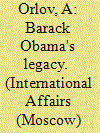

|
|
|
|
|
| Summary/Abstract |
THIS ARTICLE is a logical continuation of my previous essay, "Barack Obama: Preliminary Results of Presidency"1 that I ended with: "Obama has several months to go down to history not as the president of numerous conflicts and the state of international relations close to the Cold War but as the president who gave the world a slim hope of positive changes." Today, we can say that he has missed his chance to be remembered as a peacemaker and a realistically minded president who knew how to defuse international tension rather than fan it to worldwide dimensions. Indeed, he did all he could to leave behind a wasteland of American-Russian relations and not the slightest hope of positive changes any time soon.
|
|
|
|
|
|
|
|
|
|
|
|
|
|
|
|
| 2 |
ID:
173326


|
|
|
|
|
| Summary/Abstract |
Five aspects of the BJP's election campaign contributed to its success in 2019. The first is the personal appeal of the prime minister, which again played a major role, like it did in 2014, as Narendra Modi led a hyper-personalized campaign. Second, this campaign focused on security-related themes which were especially relevant in the context of the India-Pakistan tensions. Third, the BJP campaign strategy was backed by the most formidable election campaign machinery assembled by any party in India since Independence. Fourth, the BJP saturated the public space with the prime minister's image, adroitly using the traditional mainstream media as well as social media. The party used religious appeal to address its core base of supporters while projecting the prime minister's image as a protector and sentinel. Fifth, the latter three aspects of the BJP's campaign were fuelled by unprecedented levels of campaign expenditure and by the opacity of political funding in India, which the BJP had made more impenetrable through the introduction of electoral bonds. The combination of these factors show that the 2019 elections were not business as usual; their singularity largely due to the decline of institutions regulating the electoral process, including the Election Commission of India.
|
|
|
|
|
|
|
|
|
|
|
|
|
|
|
|
| 3 |
ID:
130462
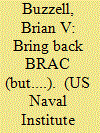

|
|
|
| 4 |
ID:
155346
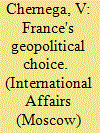

|
|
|
|
|
| Summary/Abstract |
THE FRENCH MEDIA wrote about the 2017 presidential campaign in France as unprecedented: for the first time in the history of the Fifth Republic, it was neck-and-neck race of four candidates in the first round of election. Emmanuel Macron who posed as an independent candidate got 24.1% of the votes; President of the National Front Marine Le Pen. 21.3%; nominee of the Republicans Fran�ois Fillon finished with 20.1%. and the leader of extreme left Jean-Luc Mélenchon with 19.58% was the last of the four at the finishing line.1 The extent of disorientation of the French electorate and the unprecedented split were amply confirmed in the second round by the fairly good results of Marine Le Pen (33.9%) confronted by practically all political forces of France; by the much lower turnout - 74.56% against 77.77% in the first round - and a much bigger share of votes blancs: 4.86 million or 11.52%.
|
|
|
|
|
|
|
|
|
|
|
|
|
|
|
|
| 5 |
ID:
126947
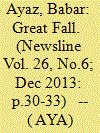

|
|
|
| 6 |
ID:
137550
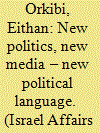

|
|
|
|
|
| Summary/Abstract |
Political campaigns running during the Israeli general elections of 2013 saw a rapidly growing use of new media. According to reports, most of the electronic campaign activity focused on candidates' or their respective party's Facebook page. This article explores the rhetorical dimensions of electronic campaigns and particularly focuses on the formation of the public image of three candidate, all of whom were identified with the promise of a ‘new politics’: Yair Lapid, head of the newly formed ‘middle class party’ Yesh Atid; Shelly Yachimovich, head of the Israeli Labour Party; and Naftali Bennett, newly elected head of the religious Zionist party, Habayit Hayehudi. The rhetorical analysis uncovers three discursive strategies used by all three candidates: informality, meta-textuality and narrativity. These discursive strategies transform the campaign microblogs into personal ‘campaign diaries’ used by the candidates to account for ‘behind the scenes’ anecdotes, impressions and insights. The analysis shows that candidates used personal Facebook microblogs to strengthen their image as authentic and complex characters, rather than mediated personas engineered by campaign managers. This article argues that such political images were strategically designed in order to support the campaigns' promise to break from the ‘old politics’ and warrant the candidates' commitment to the ‘new politics’.
|
|
|
|
|
|
|
|
|
|
|
|
|
|
|
|
| 7 |
ID:
153472
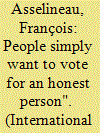

|
|
|
|
|
| Summary/Abstract |
Armen Oganesyan, Editor-in-Chief of International Affairs: This year marks the tercentennial of the establishment of diplomatic relations between Russia and France. It is believed that official bilateral relations were established because of Peter the Great's visit to Paris. M. Asselin-eau, how do you assess the potential for Russian-French relations? How important can it be not only for our two countries but also for the international community?
|
|
|
|
|
|
|
|
|
|
|
|
|
|
|
|
| 8 |
ID:
137544
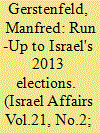

|
|
|
|
|
| Summary/Abstract |
On 15 October 2012, the 18th Knesset – which had been elected in February 2009 – voted unanimously to dissolve. The date for the elections for the 19th Knesset was then set for 22 January 2013. This article follows the events leading to the election day. It shows that there were four distinct phases during that period. It describes the internal organization and primary elections in Israel's major parties, Likud and Avoda; the debate about the formation of political alliances which led to the joint list of Likud–Israel Beiteinu; the stabilization of the political blocs; and the emergence of new political forces (such as Yesh Atid). The article also discusses the impact of major events, such as the military operation Pillar of Defence, on the elections and the electoral campaign. The article discusses the parties’ campaigns and the proliferation of opinion polls. It also shows that much of the campaigning of the parties was directed against other parties of the same bloc, be it the centre-right or the centre-left.
|
|
|
|
|
|
|
|
|
|
|
|
|
|
|
|
| 9 |
ID:
093896
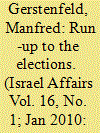

|
|
|
|
|
| Publication |
2010.
|
| Summary/Abstract |
On 26 October 2008 President Shimon Peres called for new elections. The Knesset was dissolved on 11 November. Three candidates claimed that they were in the running for prime minister: Livni, Netanyahu and Barak. The election campaign would focus more on individuals than on parties. The security issue took high priority in the elections. A major issue throughout the campaign was the position of the leading parties on the establishment of two states for two peoples as part of a peace agreement. The internet became a major tool in the campaign. On the morning of 27 December, the IDF began a war in the Gaza Strip, which Israel called Operation Cast Lead. The major parties agreed to suspend their campaigns until the end of the war. Kadima's victory with 28 seats came as a surprise. The Likud came second with 27 seats, having lost voters at the end of the campaign to the third largest party Yisrael Beiteinu, which ended up with 15 Knesset seats. Looking back at the election campaign one can best define it as a broken and shortened one.
|
|
|
|
|
|
|
|
|
|
|
|
|
|
|
|
| 10 |
ID:
166417
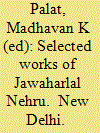

|
|
|
|
|
| Publication |
New Delhi, JawaharLal Nehru Memorial Fund, 2018.
|
| Description |
xxv, 722p.: ill.hbk
|
| Series |
2nd Series
|
| Contents |
Vol. 75: 7 February - 15 March 1962
|
| Standard Number |
9780199489015
|
|
|
|
|
|
|
|
|
|
|
|
Copies: C:1/I:0,R:0,Q:0
Circulation
| Accession# | Call# | Current Location | Status | Policy | Location |
| 059668 | 954.042/PAL 059668 | Main | On Shelf | General | |
|
|
|
|
| 11 |
ID:
124050
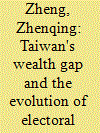

|
|
|
|
|
| Publication |
2013.
|
| Summary/Abstract |
Taiwan's economic downturn and wealth gap, under the impact of the 2008 global financial crisis, spurred livelihood/redistributive questions to become electoral issues. This paper explores the linkage between the wealth gap and electoral campaigns, and points to a new political economy trend in today's Taiwan: class mobilization has become the new driver of party politics, with identity mobilization played down.
|
|
|
|
|
|
|
|
|
|
|
|
|
|
|
|
| 12 |
ID:
153462
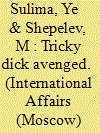

|
|
|
|
|
| Summary/Abstract |
INAUGURATED ON JANUARY 20, 2017 as the 45th President of the United States, Donald John Trump was well known to the nation as a businessman who had never filled any state posts and never craved the presidency. Back in 1990, he said: "I don't want to be President. I'm one hundred percent sure. I'd change my mind only if I saw this country continue to go down the tubes."1 This means that by 2015 when he decided to run on his own money, without sponsors and lobbyists, to become the best American president he had been absolutely sure that the country was going down the tubes.
|
|
|
|
|
|
|
|
|
|
|
|
|
|
|
|
|
|
|
|
|